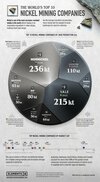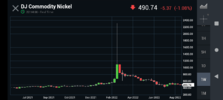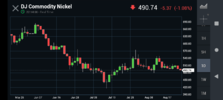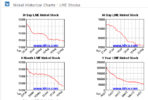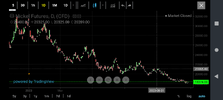- Joined
- 28 May 2020
- Posts
- 6,279
- Reactions
- 11,905
Further to the "default" on Nickel exposure, comes an interesting conspiracy theory about the LME.
From Zero Hedge
Perhaps it can be found in the statement from another Zero Hedge Story
so we find that once again, the Chinese look after their own and screw everyone else.
It also highlights how JP Morgan will let nothing get in the way of them making a buck or two.
Mick
From Zero Hedge
So why would the LME not bankrupt the Chinese , and in the process push the losses onto the other LME members?Like many commodities, nickel price has surged from the Covid lows. However this week is has spiked, effectively doubling, and briefly reached highs earlier this week of USD 100,000.
In response to this move, the LME has closed the market for nickel, and cancelled trades.
Why have they done this? Essentially this was to give time (and by cancelling trades, reduce the amount) for a major (Chinese) member to make a margin call. But in reality this was default by a member, and LME choosing not to place that member in default.
If we look at the default by Einer Aas in 2018, we can see why this is a default in all but name. When Einer Aas could not make a marign call he was bankrupted. His default waterfall is shown below. His initial margin was taken, then his default fund contribution. Value unknown, but I would estimate around €30MM. The clearinghouse then chipped in €7MM, and then there as a €107MM from the commodity service default fund. This commodity service default fund is paid by “surviving” members of clearinghouse. As every clearinghouse trade is matched, typically “surviving” members are the winners, or traders that have been on the right side of the trade.
The loss on the LME Nickel trade has been estimated at up to USD 12bn. The LME default fund (4.2 on its IOSCO CPMI disclosure) is given at USD 1bn. I don’t know if that number is entirely accurate, of if all of it can be applied to the nickel market, or is segregated by product. Clearly, there was a counterparty who could not make margin call, and if the rules had been followed, they should have been declared bankrupt, and the position sold, and any losses would be paid by LME, and then surviving members.
However, LME has cancelled trades, to reduce the price from USD 100,000 to USD 50,000, closed the market until Friday, and will limit price movements to 10% a day.
What does this mean? We know that one major counterparty should have gone bust, and is now getting a stealth bailout from the clearinghouse. Rather than asking surviving members to recapitalize, it has artificially adjusted prices to reduce their winnings. All of this has been done without consulting all members, and to the benefit of as far as we know one well connected member. As mentioned before, in 2019 large clearinghouse members recommended reforming the default waterfall.
Perhaps it can be found in the statement from another Zero Hedge Story
Needless to say, the fact that the LME is now owned by Hong Kong Exchanges and Clearing, whose biggest shareholder is the Hong Kong government which for the past two years has been a puppet of China, did not hurt Xiang, whose empire would have been bankrupted had the LME forced him to make payment on his margin call. None other than outgoing LME chief executive Matt Chamberlain admitted as much.
Long story short: if you are a small nobody and your margin call will wipe out just you, nobody will think twice to margin you out; on the other hand if you are a Chinese tycoon whose default will ruin not just him but lead to massive losses for all LME members and also drag down more than one broker in the process (as Russell Clark explained earlier), well then... the rules can certainly be bent.
And sure enough, on Wednesday morning, two days after Xiang was supposed to be in default buried by billions in margin calls, Bloomberg reports that he has successfully secured "a package of loans from local and international banks to help it meet a wave of margin calls."
According to the report, Tsingshan Holding has won credit promises from - drumroll - none other than JPMorgan Chase, and one of China's largest banks, China Construction Bank, in meetings that ran into the pre-dawn hours of Wednesday morning. Some of the terms, such as how much extra collateral Tsingshan needs to pledge, are still under discussion, Bloomberg's sources said.
Since JPMorgan's assistance alone was not enough, Chinese authorities also directed Tsingshan’s domestic banks to offer more credit lines to the company, with the bulk of the new capital going toward satisfying the margin calls on its existing positions on the London Metal Exchange.
so we find that once again, the Chinese look after their own and screw everyone else.
It also highlights how JP Morgan will let nothing get in the way of them making a buck or two.
Mick

